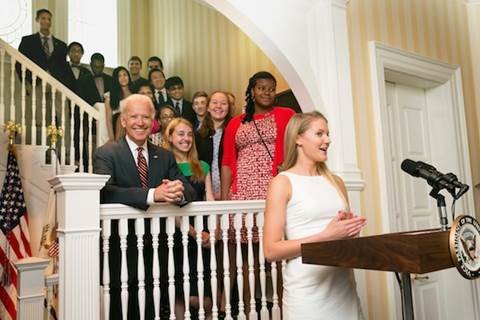
As we honor our service members and veterans during Military Appreciation Month this May, it’s important to remember that kids serve, too.
It’s often not easy being the child of a military family, particularly when it comes to one’s education. Children of our nation’s service members attend six to nine different school systems on average, moving about every two years before they graduate from high school. Those transitions can make it hard to stay on track toward the goal of higher education. That is why Joining Forces, led by First Lady Michelle Obama and Dr. Jill Biden, with support from the White House Office of Science and Technology Policy (OSTP), is celebrating the work of organizations like the National Math and Science Initiative (NMSI), which is expanding support to military-connected students.
At a recent reception at the Naval Observatory, Vice President Joe Biden, OSTP Director Dr. John Holdren, leaders from the Department of Defense and NASA and other invited guests joined students and teachers from military-connected schools across the country to celebrate new commitments to NMSI’s College Readiness Program for Military Families.

Vice President Joe Biden with students from Aberdeen High School (Aberdeen, MD) at the Naval Observatory on April 27. (Photo credit: Paul Morse).
This program is broadening access to rigorous Advanced Placement (AP) coursework in math, science, and English, and ensuring that students have the knowledge and skills they need to graduate from high school ready for college and the STEM-intensive careers of the 21st century. Given that AP curricula are uniform across the country, this program provides continuity for students whenever and wherever their families may be transferred. AP courses are not only a good barometer for students’ future academic success—they also give students the opportunity to earn college credit and thereby save on college tuition costs.
NMSI’s program is the type of public-private partnership that can improve educational opportunities and student outcomes nationwide. With new funding commitments made by the Department of Defense and a coalition of partners, the program will be able to reach nearly 17,000 more military-connected students, bringing the total to nearly 50,000 in 35 states—ensuring that they will be prepared for the rigors of college and career.
That is an impressive accomplishment since the launch of the Joining Forces initiative four years ago and release of the Presidential Study Directive on Military Families, which included access to AP courses for military students as a goal.
As we honor Military Appreciation Month, we should all do our part to help ensure that more military families and their children get the best possible opportunities, and look for ways to build on the important progress already made.
Kumar Garg is Assistant Director for Learning and Innovation at the White House Office of Science and Technology Policy.
Jamie Lyons is Policy Director for Dr. Jill Biden.

